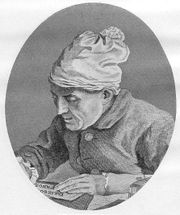
Richard François Philippe Brunck
Encyclopedia

French people
The French are a nation that share a common French culture and speak the French language as a mother tongue. Historically, the French population are descended from peoples of Celtic, Latin and Germanic origin, and are today a mixture of several ethnic groups...
classical scholar.
Biography
Brunck was born in StrasbourgStrasbourg
Strasbourg is the capital and principal city of the Alsace region in eastern France and is the official seat of the European Parliament. Located close to the border with Germany, it is the capital of the Bas-Rhin département. The city and the region of Alsace are historically German-speaking,...
, France, educated at the Jesuits' College in Paris, and took part in the Seven Years' War
Seven Years' War
The Seven Years' War was a global military war between 1756 and 1763, involving most of the great powers of the time and affecting Europe, North America, Central America, the West African coast, India, and the Philippines...
as military commissary. At the age of thirty he returned to Strasbourg to resume his studies, especially Greek
Greek language
Greek is an independent branch of the Indo-European family of languages. Native to the southern Balkans, it has the longest documented history of any Indo-European language, spanning 34 centuries of written records. Its writing system has been the Greek alphabet for the majority of its history;...
. He spent considerable sums of money in publishing editions of the Greek classics.
The first work he edited was the Anthologia Graeca or Analecta veterum Poetarum Graecorum (1772–1776), in which his innovations on the established mode of criticism startled European scholars. As an editor, he made no commentaries, but occupied himself only with the text. Persuaded that all faults in the language of the Greek poets came from the carelessness of copyists, wherever it seemed to him that an obscure or difficult passage might be made intelligible and easy by a change of text, he did not scruple to make the necessary alterations, whether the new reading were supported by manuscript authority or not.
He became a member of the Académie des Inscriptions et Belles-Lettres
Académie des Inscriptions et Belles-Lettres
The Académie des Inscriptions et Belles-Lettres is a French learned society devoted to the humanities, founded in February 1663 as one of the five academies of the Institut de France.-History:...
in 1777.
Other Editions
Other works by him are editions of AnacreonAnacreon
Anacreon was a Greek lyric poet, notable for his drinking songs and hymns. Later Greeks included him in the canonical list of nine lyric poets.- Life :...
(1778), several plays of the Greek tragedians, Apollonius Rhodius (1780), Aristophanes
Aristophanes
Aristophanes , son of Philippus, of the deme Cydathenaus, was a comic playwright of ancient Athens. Eleven of his forty plays survive virtually complete...
, with an excellent Latin translation (1781–1783), Gnomici poetae Graeci (1784), Sophocles
Sophocles
Sophocles is one of three ancient Greek tragedians whose plays have survived. His first plays were written later than those of Aeschylus, and earlier than or contemporary with those of Euripides...
(1786), with Latin
Latin
Latin is an Italic language originally spoken in Latium and Ancient Rome. It, along with most European languages, is a descendant of the ancient Proto-Indo-European language. Although it is considered a dead language, a number of scholars and members of the Christian clergy speak it fluently, and...
translation, a work for which he received a pension of 2,000 franc
Franc
The franc is the name of several currency units, most notably the Swiss franc, still a major world currency today due to the prominence of Swiss financial institutions and the former currency of France, the French franc until the Euro was adopted in 1999...
s from the king. He also published editions of Virgil
Virgil
Publius Vergilius Maro, usually called Virgil or Vergil in English , was an ancient Roman poet of the Augustan period. He is known for three major works of Latin literature, the Eclogues , the Georgics, and the epic Aeneid...
(1785), Plautus
Plautus
Titus Maccius Plautus , commonly known as "Plautus", was a Roman playwright of the Old Latin period. His comedies are the earliest surviving intact works in Latin literature. He wrote Palliata comoedia, the genre devised by the innovator of Latin literature, Livius Andronicus...
(1788) and Terence
Terence
Publius Terentius Afer , better known in English as Terence, was a playwright of the Roman Republic, of North African descent. His comedies were performed for the first time around 170–160 BC. Terentius Lucanus, a Roman senator, brought Terence to Rome as a slave, educated him and later on,...
(1797).
French Revolution
At the outbreak of the French RevolutionFrench Revolution
The French Revolution , sometimes distinguished as the 'Great French Revolution' , was a period of radical social and political upheaval in France and Europe. The absolute monarchy that had ruled France for centuries collapsed in three years...
, in which he took an active part, Brunck was imprisoned at Besançon
Besançon
Besançon , is the capital and principal city of the Franche-Comté region in eastern France. It had a population of about 237,000 inhabitants in the metropolitan area in 2008...
, and lost his pension, being reduced to such extremities that he was obliged to sell a portion of his library. In 1802 his pension was restored to him, but too late to prevent the sale of the remainder of his books.

